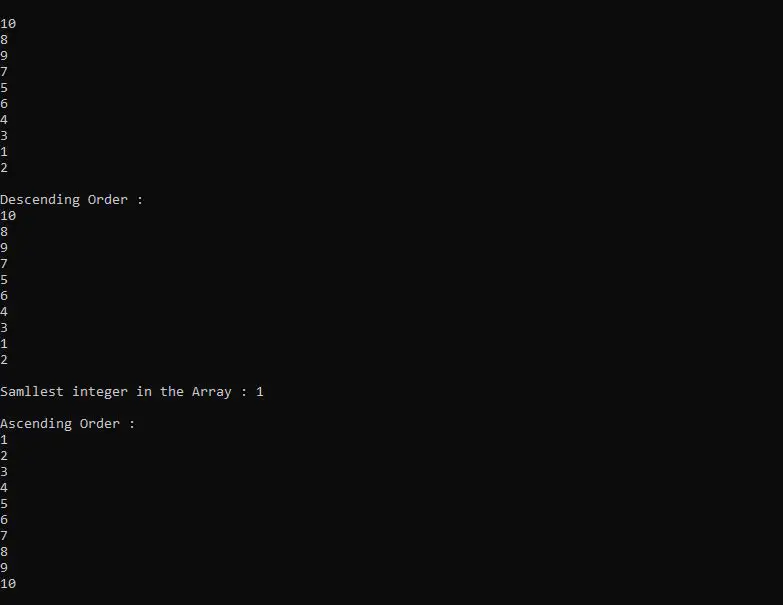C# Program that read array display the smallest integer and sorts the array in ascending order by using Array.Sort method.
Object:
Write a program in C# to read a one-dimensional integer array from the user, display the smallest integer in the array, and sort the array in ascending order by using Array. Sort method.
Code:
using System;
using System.Collections.Generic;
using System.Linq;
using System.Text;
using System.Threading.Tasks;
namespace TEST2
{
class Program
{
static void Main(string[] args)
{
int[] s = new int[10];
Console.WriteLine(“Please Enter 10 Value of Array. \n”);
//read array value from user
for (int i = 0; i < 10; i++)
{
s[i] = Convert.ToInt32(Console.ReadLine());
}
int smallest_element = s[0];
Console.WriteLine(“\nDescending Order :”);
foreach (int a in s)
{
Console.WriteLine(a);
}
//find smallest value
for (int i = 1; i < 10; i++)
{
if (s[i] < smallest_element)
{
smallest_element = s[i];
}
}
Console.WriteLine(“\nSamllest integer in the Array : ” + smallest_element);
Array.Sort(s);
Console.WriteLine(“\nAscending Order :”);
foreach (int a in s)
{
Console.WriteLine(a);
}
Console.ReadLine();
}
}
}
using System;
using System.Collections.Generic;
using System.Linq;
using System.Text;
using System.Threading.Tasks;
namespace TEST2
{
class Program
{
static void Main(string[] args)
{
int[] s = new int[10];
Console.WriteLine("Please Enter 10 Value of Array. \n");
//read array value from user
for (int i = 0; i < 10; i++)
{
s[i] = Convert.ToInt32(Console.ReadLine());
}
int smallest_element = s[0];
Console.WriteLine("\nDescending Order :");
foreach (int a in s)
{
Console.WriteLine(a);
}
//find smallest value
for (int i = 1; i < 10; i++)
{
if (s[i] < smallest_element)
{
smallest_element = s[i];
}
}
Console.WriteLine("\nSamllest integer in the Array : " + smallest_element);
Array.Sort(s);
Console.WriteLine("\nAscending Order :");
foreach (int a in s)
{
Console.WriteLine(a);
}
Console.ReadLine();
}
}
}
Output:
Another C# Program: C# Program Calculating the Area of a Rectangle
Another C# Program: C# Program that Subtracts two user-defined numbers
Another C# Program: C# program to count vowels in a string
Another Program: Write a C# program that reads two arrays and checks whether they are equal.
Another Program: Develop a C# app that will determine the gross pay for each of three employees
Program: Write a C# program to demonstrate the multiple inheritances


Pingback: The C Programming Language Structure with C Language data types